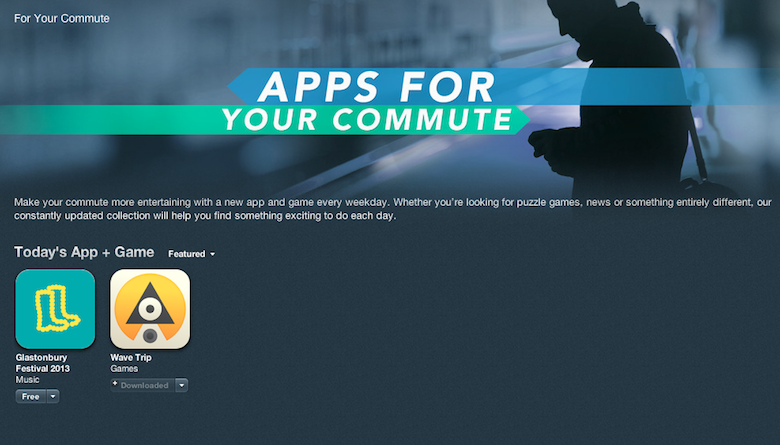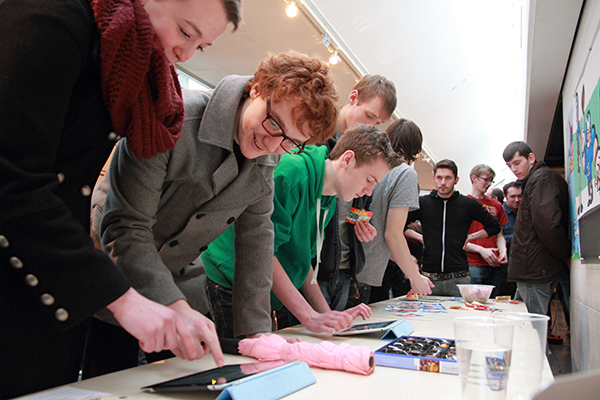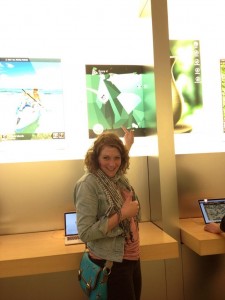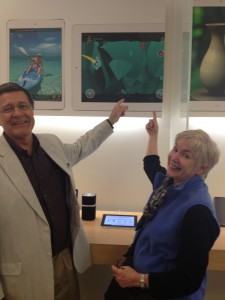an update on Gentlemen!
Three weeks ago we released Gentlemen! for iPad and Android. If you aren’t aware of it, it’s a 2-player head-to-head Victorian dueling game for tablets. Two players required! Go buy it if you like – here’s the App Store link, Google Play, our marketing site, and a presskit site. It’s on sale until Monday, so now’s your chance.
Since that release we have been working on a desktop Mac/PC version, for up to 4 players. It’s now nearly done! And it’s super fun. We’ve been playing it a lot in the office, and having friends over to play too…we’ve starting falling into the trap of just playing game after game after game, which I suppose is a good sign.
So we will be releasing that soon, at the same price as the tablet version ($5). If you’re a journalist/blogger/fan and you’d like an advance preview, let us know.
Let’s get down to a bit of a release analysis.
Without a doubt, Gentlemen! was one of the best-reviewed projects we have ever produced. We received a coveted 8/10 on Edge, 4.5 stars on Touch Arcade, and a 9/10 Gold Award on PocketGamer. This was totally brilliant, and we are so proud.
It’s interesting to think about why we got such great reviews. Obviously it’s a game that we’re super proud of, and we think it’s amazing, but that’s not always enough to secure great critical acclaim.
At one point, during the development process, we were planning to make a single player mode in the game. We got as far as mocking up some concepts and even designing a few challenge levels before deciding that it wasn’t a good idea. Gentlemen! was designed from the very first prototype to be a local multiplayer game – the gravity flipping, the level layout, it was all created with two players in mind. Any single player mode would have been superfluous and probably not very fun.
I think the positive reviews were an unanticipated outcome from this decision. If Gentlemen! had a half-baked single player mode, then reviewers would probably have only played that and not enjoyed it very much. Instead, the reviewers had to find someone to play with, and play a game together for enough time to make an educated assessment. As it turns out, playing games with other people is super fun, and I think it’s harder to be negative or cynical about a game when you’re sitting across from someone who is having a blast throwing pigeons at you.
The downside, of course, is that not all reviewers were able to find someone to play with. Reviewing games tends to be a fairly solitary activity, and more than one reviewer really wanted to test the game but was unable to find people to play with. We are lucky to have really great support from a number of different media outlets, and several of them made the extra effort to review Gentlemen! – though our overall number of reviews was far lower than Bad Hotel or Wave Trip.
Another interesting result of our no-compromises was that we have gotten some user reviews, almost exclusively on iTunes, saying that we should make a single player version, or network multiplayer. Partially this is my fault, because the marketing copy says “Two Players Required!” and many people don’t realize that means “two players in the same place”. But there is also a funny logical thing going on, where many of the reviews say something like “Good game, could be so much better with online multiplayer or ai”. This is strange to me, because it admits that it is a good game, but then goes on to say that it should be different. My argument would be that the whole reason this is a good game is because you play it with a friend!
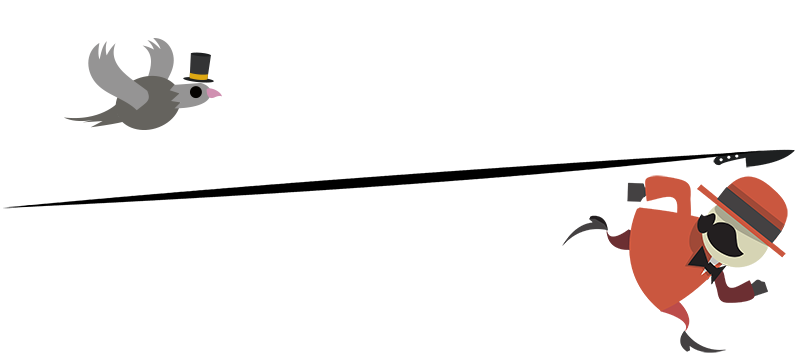
So! Great reviews? Check. How does this translate into sales?
So far we have sold 1,047 copies on iPad, and 112 copies on Android.
Whether this is a ‘good’ result is up for debate. Certainly, many many games are released every day that don’t sell anything close to these numbers. We knew very well that we were making a pretty esoteric game, in the sense that it is limited to iPads and tablets bigger than 7 inches and requires two players, so we didn’t exactly have high expectations. We also set the price relatively high – starting at $5, and currently on sale for $3. So far the number of sales is a bit lower than we hoped – my personal target was to sell 2000 copies, but with a little luck we will get there!
As a side note, amateur mathemagicians out there will realize that selling 2000 copies, even at our high price point, is not exactly good business for a 3-person studio working on a game for 5 months. Well, that’s because for this project we were really lucky to be supported by the Prototype Fund, a brilliant support grant run by the University of Abertay in Dundee. They give money to studios who want to make something great without the crushing weight of commercial expectations. We certainly couldn’t have made the game without them, and we are extremely privileged to live and work in a society where this exists.
One problem we definitely had was that just as we were releasing our game, a lovable little scamp named Psy happened to release a song named “Gentleman”. The deep irony of all of this was that we had a really hard time naming our game, and for the longest time it had the terribly uncatchy title of “Martin vs. Monty”. We finally settled on “Gentlemen!” (other ideas: ‘Scoundrels’, ‘East Stabwich’, ‘The Panic of 1857’, ‘Crumpet Clash’, etc) and sent out all of the promo material accordingly, blissfully unaware of this pop song. You wouldn’t think a pop song would cause problems for an app, but we quickly learned about the seedy world of games and apps piggybacking on other entertainment media. What a strange time we live in. Also, how depressing that people spend their time making Jetpack Joyride ripoffs using graphics referencing pop songs. So unfortunately, discovery was and remains a major problem.
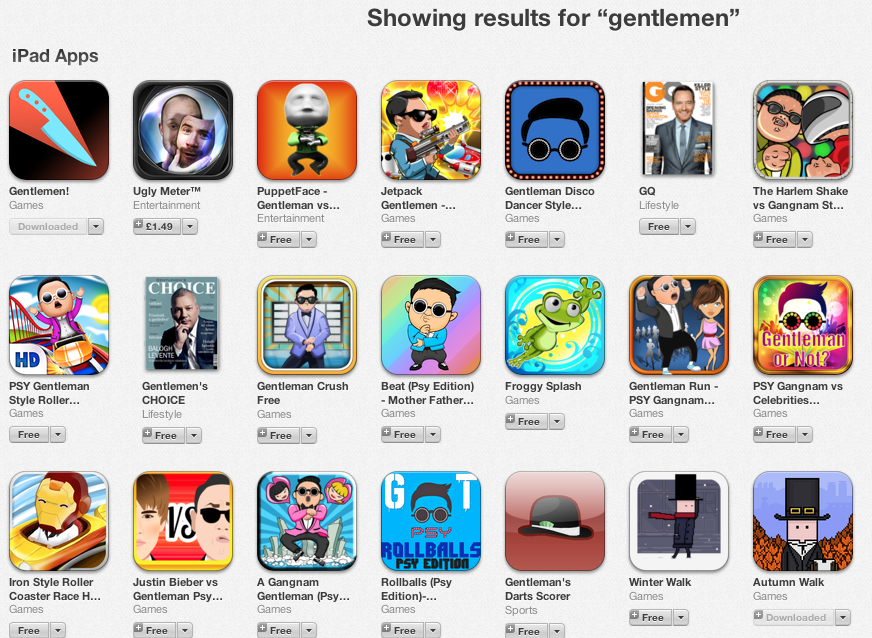
pretty cool to see the wonderful Autumn Walk and Winter Walk on there though…
We also didn’t really get any featuring from Apple for this release, which was too bad, but then they have really supported our previous releases so we can’t complain!
Anyway, pricing a game is always an interesting question, and there were a few eyebrows raised at our initial $5 price. Part of our thinking was that a two-player game has a higher value than a single player game, because it is being shared with friends. Tablet games can sometimes command a higher price as well, I suppose just because the bigger screen size conveys greater value. But most importantly we believe that Gentlemen! gives you way more than $5 worth of fun. We’ve watched people play game after game, and we get feedback from users who say they play with their child/partner/parent for an hour or more at a time. It’s a bit of a tired argument, but the fact remains that this is pretty great value entertainment. Finally, there’s a bit of a trend in the indie game world for raising prices on games, and we’re in favor of that and wanted to fit into the cool kids club.
(all of that said, it’s on sale for $3 until Monday! so go get it now if you want us to have less money)
A few days after release, we started noticing some pretty strange statistics on the Android version. At the last minute we had included an analytics package into the game that told us how many unique users there were playing around the world. After two days we had sold a total of 8 copies on Google Play, but we were getting significantly more players. The numbers surprised us so much that we actually contacted the analytics company to confirm that we were interpreting them correctly. Once we had done that I posted on the Lucky Frame twitter feed, asking people to guess how many pirated copies were being played. Nobody got anywhere near:
Ok! I think I’ll call time on this. Official Android sales numbers for Gentlemen! after three days: 8 copies sold. 2,462 copies pirated.
— Lucky Frame (@lucky_frame) July 19, 2013
If you’re interested, after three weeks those numbers are now 112 copies sold, over 40,000 copies pirated. And they said it wouldn’t last!
This set off a firestorm of social media activity – basically, I spent the next three days responding to tweets and facebook messages (844 retweets!). It resulted in a definitely jump in Android sales (we sold about 25 the next day – woo marketing!) and generated some interesting discussion around the interwebs. This taught me several things…
People love hating on specific technology companies.
This experience was very similar (though much larger scale) to our whole experience with the unVerse rejection. Whilst that story provided fodder to Apple haters, releasing this data was a great example of confirmation bias. One narrative that kept appearing was “this is why you shouldn’t develop for Android”, or more bluntly “this is why Android sucks”.
I find this attitude pretty silly. Let’s face it, all of these devices are just computers. Some of them have nice UI, some of them have nice product design, and they all certainly have downsides. It’s pretty sad when people associate electronics products with lifestyle choices, and judge others accordingly. These devices and companies are loaded with moral and ethical dilemmas, there is very little critical thought devoted to their place in the world, and the differences between them are negligible at best. Instead of saying “Product X is so much better than Product Y” or “Fans of Product X are blind/idiots/fanboys”, we should really be saying “How can we use this technology in a positive way?”
On a more technical note, the idea that we “shouldn’t develop for Android” is kind of ridiculous. We made Gentlemen! in the Unity game engine, which makes building an Android version extremely easy. It probably took us an extra two or three days to make the android version (out of a 5 month develop cycle), so even if we only sell 200 copies total it’s still just about worth it.
We made an awesome game
Many people assumed that we were really upset about this statistic. In retrospect, talking about the piracy numbers on twitter probably implies that we were unhappy, but in reality the number of pirates just confirmed to us that we made a game that people love to play! The people who are pirating our game are also playing a surprising amount, with really great engagement – these are no casual pirates just downloading because they can. So this confirmed to us that our game design is solid, and that we’ve made a super fun game that people enjoy. To be honest, that is really great. It’s unlikely that any of these pirates would have bought the game anyway, so we’re just glad that people are playing. Android makes piracy very easy, and thanks to that Gentlemen! is being played by more people around the world than all of our previous games combined.
Devices are complicated
A lot of talk has been devoted to the insane amount of Android phones and tablets on the market, and how this poses a challenge to developers. We were very wary of this, and our strategy was to release only for devices that we were able to test on. This was a pretty limited number of mostly Google Nexus and Samsung devices. Our thinking was that we didn’t want anyone to buy the game and then have a negative experience with it. We got a fair amount of criticism for this, with people saying that the game wasn’t available for purchase on their specific device. We’re still undecided on how to approach this, because it is very scary to allow people to buy our game on a tablet or phone on which it won’t run well. We thought that releasing on the most popular devices would be fine, but it probably wasn’t.
On the other hand, I don’t think that this was responsible for our piracy rate. It seems unlikely to me that people tried to buy it on Google Play, found it wouldn’t run on their device, and then tracked down a torrent instead. It’s far more likely that the people who pirated the game have only one method of finding and installing apps, and that is through pirate sites.
Predictable locations
One thing that helped me reach that conclusion was the location statistics for the pirated copies. About 95% of the pirated copies are being installed in Russia and China (and of those, mostly China). We didn’t even translate our Google Play store into Russian or Chinese, so it’s almost certain that the pirates just found our app on localized pirate sites. On the other hand, I’m glad our menu design is intuitive enough that you can play the game without speaking English!
We have a lot to learn
This was our first Android release. We probably could have done more to avoid the massive piracy of our game – or, even better, convert pirate users into paid users. I think that Android apps are definitely going to get pirated no matter what…I can only dimly imagine the level of piracy that a truly successful paid app has. However if we had anticipated this situation we probably would have included some sort of in app purchase, perhaps to unlock extra levels or game modes. At least then the pirates would have the opportunity to pay us a little something if they were enjoying it so much – the main problem is that most of these pirates probably exist in a commercial ecosystem where the Google Play store does not even exist, and it doesn’t occur to them to buy any games from there at all.
User reviews
One small thing that really surprised us – Google Play users are far more likely to leave reviews in the store…and very positive ones at that! Nearly 10% of the people who bought the game on Google Play have left reviews, averaging 4.8 stars. On iTunes, it’s more like 0.01%, and we’re only averaging 3.2 stars. Awww!
So there you go. As I mentioned, we’re now gearing up to release the desktop version of Gentlemen! so if you’d like a sneak peek, please drop us a line at info@luckyframe.co.uk.
Gentlemen! out now…
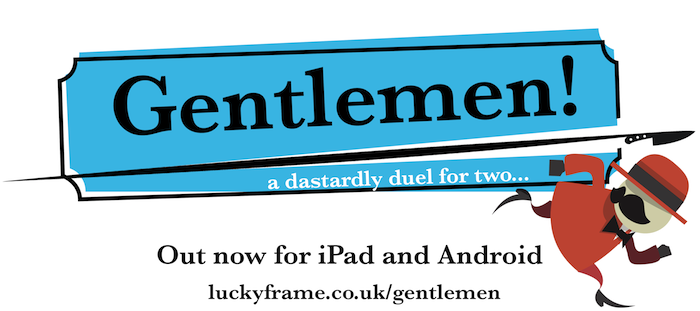
Our new game, Gentlemen! is out now for iPad and Android. Go buy it!
App Store Link
Google Play Link
We’ve already garnered some amazing reviews…we’re very proud:
Pocket Gamer, 9/10, Gold Award
Edge Online, 8/10
Touch Arcade, 4.5/5
Thanks to everyone who helped put this out! If you’d like more information, please visit our Presskit page, and don’t hesitate to get in touch by writing us at info@luckyframe.co.uk.
Apps For Your Commute
Apple are really loving Wave Trip these days…after featuring in Apple Stores worldwide and in the WWDC presentation, Wave Trip is now featured in the UK App Store as an “App For Your Commute”!
We certainly agree that Wave Trip is brilliant for commutes – short levels, non-punishing creative gameplay, a dash of level building to add creative spice to your morning – but we thought we’d take this opportunity to talk about some of our favorite commuting games.
First up, press and marketing guru Kristina, who you may remember from the “Hope With Added Strategy” blog post, or perhaps from the Lucky Frame stand at GDC this year. Kristina has another day job which makes her something of a commuting expert…
—
Kristina
I have been a serious commuter for almost two years traveling from Edinburgh to Dundee and back again everyday (about an hour and twenty minutes each way). My experience isn’t unusual, new research shows that the average worker in the UK spends 41 minutes commuting daily and almost 2 million people spend over 3 hours commuting everyday.
Commuting isn’t always fun, especially when you have so far to go, but it does present you with a fantastic opportunity to do new things and spend time for yourself. Having an extended period to try out new games uninterrupted is one of these advantages. So with that in mind here are my recommendations for games designed for the serious commuter:
Superbrothers Sword and Sworcery
![]()
So much praise has been heaped on this game that it may seem like an obvious suggestion but it’s worth pointing out why this game is particularly suitable for a serious commuter.
The storyline is complex and mysterious, and the writing is really excellent. It manages to keep you entertained, giving you something to think about in those moments at work when you find your mind less actively engaged. When I was working my way through this game I actually found myself looking forward to getting onto the train to play the next installment.
The levels can comfortably be completed in 40 minute segments. Just enough time to get settled in play it through and have time to put your makeup on and check your email before you arrive at your destination.
Other reasons to love this game: It has a female protagonist who isn’t a sex object. The game arc is time sensitive so you can only play certain elements on certain days of the month – delayed gratification just makes that commute all the more rewarding. Oh, and the artwork is beautiful. Negative points: after a while I got really bored chasing sylvan sprites and the musical element is a little too self aware, but the overarching story kept me coming back.
Year Walk by Simogo

Full disclosure, I didn’t play through Year Walk on the train but on a mammoth 15 hour journey from San Francisco to Edinburgh via Newark. Put quite simply, this game blew me away. I would describe Year Walk as a post-modern literary horror puzzle game that reminded me of reading Mark Z. Danielewski’s epic novel House of Leaves. The graphics are gorgeous and it’s just difficult enough to keep you engaged without becoming off-putting. I cried at the end.
NarcoGuerra by Game The News
![]()
A strategy game where you play a police captain trying to crush the drug cartels of Mexico. This game is like a complex and compelling version of Risk where variables like the street price of drugs and which political party you support undermine your efforts for victory.
Playing the game at the “difficult” level it takes me about an hour to win a game (less to lose!) and I got almost two weeks of commutes working my way through all the variables. It’s not the perfect finished article. The button size is a bit small and the dice roll mechanic is frustrating. But the impact of politics on your decisions is a compelling driver which adds an exciting twist to this game.
—
Thanks Kristina! Next up is Jonathan, 1/3 of the full time Lucky Frame crew. He currently does the opposite commute to Kristina (we’re well organised like that).
Here are Jonbro’s favorite commuting games…
—
Helix
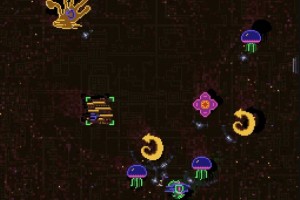
A currently unreleased game by Smestorp. This is an outright action game that operates somewhat like an arena shooter. Enemies come from all sides, and in a standard arena shooter, you would need to fire bullets at them. The brilliant mechanic flip in this game is that you need to encircle the enemies rather than firing at them. This allows it to operate much as a shooter would without the control complexity of dual stick. More than once I have needed a shoulder tap from the conductor to remind me to give them a ticket while playing this. Apparently Smestorp is still adding difficultly layers due to the game no longer being hard enough for him. Hopefully it will be out shortly, but who knows.
868-HACK
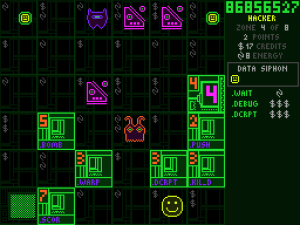
Another unreleased game by Smestorp, available in a prototype version on PC/Mac. This game operates in an entirely different space than Helix. Smestorp is one of my favorite solitare board game designers, and he has a really tight grip on the scope of a board game that works on iOS. While he has been creating and marketing these under the banner of roguelikes, I think that does them a disservice in terms of the audience that they could appeal to. Last year he released a game called Zaga-33, which is also very worth playing, which encapsulated a bunch of the ideas that he brought to this one. Single screen boards, extremely focused player verbs, graspable enemy types. 868-HACK expands on that structure and adds a very strong risk/reward system in which doing a highscore run increases your likelyhood of dying. Since you are scored on both the number of runs that you have done without dying, and also your cumulative points across those runs, there is a push to play safely. Even in low level play, it is difficult to make it to the end of the game, and requires strong planning against unpredictable systems.
Frutorious
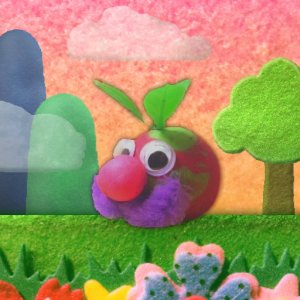
This was a pretty widely overlooked game as far as I can tell, and I think there are a few things that contributed to that. I would encourage you to overlook those issues though, because there is something really fun and charming in here. So once you get past the shonkyness of graphics (I swear, they are really charming in motion), the game at first appears to be something that controls like Angry Birds, but is brutally hard from level zero. The trick of it is that this isn’t Angry Birds at all, you can’t just be close and have gravity take over for you. You need a ton of control adjustments and perfect timing and really good aim and quick trigger fingers and all that good stuff. This is a game that appears to be about chance, when it is really about finesse. There are about a zillion levels, a bunch of which add something interesting to the mechanics of the game. In some ways it feels like a really good platformer, while entirely changing the way a platformer controls.
Hope with Added Strategy
A guest post today from Kristina Seznec, who has worked tirelessly with us since the very earliest days of Lucky Frame, helping us enormously with our press and marketing.
——
DIY Marketing and PR for Indie Games
The other day I had two dramatically contrasting experiences: In the morning I attended Digital 2013 where I watched Edward Rumley, COO at Chillingo, a division of Electronic Arts, give a presentation entitled ‘Games Strategy: Publishing Indie Mobile Games in Today’s Competitive Marketplace’. His impressively bleak presentation championed the idea that in an ever-crowded marketplace mobile indie game developers can never achieve the publicity levels needed for success without the help of a publisher.
That afternoon, with Rumley’s forbidding words echoing in my ears, I visited the Apple Store in Glasgow to check out their new billboard marketing campaign which features the independently produced and self-published app Wave Trip from Scottish independent studio Lucky Frame. What my experience at the Apple Store shows us is that Rumley’s dismissal of self-published indie games is baseless.
Stepping over the obvious irony of asking a major publisher to talk about indie games, and some of his more outrageous comments (“Just because I publish my book on Kindle that doesn’t make me a published author” – tell that to EL James), I found his presentation to be profoundly negative in its outlook, implying that if you work on your own you have simply no chance of finding an audience. It inspired me to dispel some of the myths around PR and Marketing of indie games (or in fact any artistic product). This is not a comment on whether or not you should use a publisher, Chillingo or anyone else for that mater; it is just designed to give you a starting point to promote your work.
I have been working as a PR and Marketing Professional for just under 10 years. I began my career working at a private art gallery and from there have worked for a range of public and private arts organizations across the UK including New Media Scotland, National Galleries of Scotland and most recently as Head of Marketing at Dundee Contemporary Arts. In addition to this, since 2008 I have worked with Lucky Frame as a Communications Consultant to help them plan and implement their PR and Marketing strategy for games such as Pugs Luv Beats, Bad Hotel and Wave Trip. Experience has taught me is that if you have a great indie game, and you want to self-publish, then you can get the publicity you need to be successful.
Hope is not a Strategy
One of Rumley’s more chilling statements was the most accurate: hope is not a strategy. This isn’t ‘Field of Dreams’, you are not Kevin Costner, if you build it they will not come. The App Store is littered with the dead corpses of apps that were never downloaded and whose marketing strategy was built on a wing and a prayer. The good news is there are some simple steps you can take to get your work out there.
It’s not what you know
Publishers, like Chillingo, have contacts books filled with the names and details of all the key influencers in the business. For success to come a-knocking you need to get together a list of key journalists, bloggers and influencers in your field. Chances are if you’re a hyper-keen engaged indie developer you already know who you need to target, but it’s definitely worth taking some time to do a little research. Publicity often has a snowball effect, and if this is your first project it is just as important to get on small blogs as it is to have a feature on Kotaku.
Most medium to large size organizations pay for contacts databases which are constantly updated, so it is simple for them to find that all-important email address or phone number. These systems can cost several thousand pounds and certainly take the legwork out of promotion, but they aren’t essential, something I learnt as Marketing and Audience Development Associate at New Media Scotland. At that time the company only had three employees and had just received a significant funding cut from the then Scottish Arts Council. We didn’t have the money to pay for a press database, so instead I spent an afternoon calling the switchboard of all the national newspapers and relevant magazines and broadcasters and asking for the name, email address, and phone number of their arts correspondent. This took three hours and at the end of the day I had a spreadsheet of 20 key contacts in my subject area. The next day I sent out a press release and secured coverage with several major outlets. (NB New Media Scotland has since gone on to secure new funding and moved to a new home at the University of Edinburgh find out what they’re up to at mediascot.org)
Building a contacts database isn’t hard, it doesn’t need to be expensive, it just takes time. That was several years ago and now collecting contact information is even easier with online contacts and tools like Twitter and LinkedIn. We used this exact same strategy to build the contacts list for Lucky Frame and for our last game we secured coverage in The Verge, Touch Arcade, Eurogamer, and much more.
Once you have a list of contacts you need something to send people. Journalists from bloggers to lead writers for national newspapers need a clear and concise piece of text to explain what your work is about. There are lots of tools online to show you how to write a basic press release, my favourite is this post written by Katie Cowan at Creative Boom.
It’s Nice to be Nice
It is essential you nurture your contacts once you have them. Always where possible use a named contact and don’t continually spam people with information. Talk to your contacts like humans, read their work and show an interest in what they tell you. Never get aggressive when people ignore you or write up a bad review (there is no such thing as bad publicity after all). Be in it for the long haul and remember that relentless positivity is the name of the game. And always say thank you when you get a review or write up, even if it is less than flattering. Remember it’s nice to be nice!
A Picture Tells a Thousand Words
Strong images and video are just as important as a good press release. It may be a cliché but a picture tells a thousand words and more than anything a great image or snappy video is going to sell your project. Try to make images as eye catching as possible and make sure that you offer a variety of file sizes that will work in print and online.
Lucky Frame could be said to be founded on a university video project that unexpectedly went viral. We’ve tried to echo this quirky approach to every Lucky Frame video since with mixed success but it’s always useful to give people a way to visualize your project. Don’t be frightened to think outside the box: you might find yourself in a in a cold hall chasing a group of cute but naughty dogs; or in a public park with your company founder dressed in a homemade cardboard suit; or at the depot of your local bus company; or strangest of all in a toilet with one of your more adventurous friends.
But you may well set the spark which sets the internet alight and either way it’s definitely a fun way to spend a Saturday afternoon.
Fortune Favours the Bold
Don’t be frightened to sell yourself. Where most artists who choose to self publish fail is by being too modest and too shy. Nothing beats getting out there and talking to people, both online and in person.
No publicity is bad publicity, something we learnt early on at Lucky Frame when we applied to appear on BBC business reality show Dragons’ Den. At the time it felt like a high risk strategy, the chances of getting any funding were low and the chances that Yann would make a fool of himself were high. But the opportunity to get the company name out there in front of a primetime TV audience was too good to miss. Even though we didn’t get a deal, the next day we were contacted by representatives from several major British games companies. The resulting consultancy work kept Lucky Frame afloat for a year, ultimately leading to the production and release of Mujik, the company’s first iPhone app.
Think Global, Act Local
Promoting your game face to face is just as important as online and you don’t need to be in London, New York or San Francisco to meet people interested in indie games. There is lots going on in local communities all over the UK which you can get involved in: for example Nottingham Game City are inviting developers to come and show off their work at monthly club nights and at DCA we hold regular Drop in and Play events for local developers to showcase their work. There are also a whole host of hackdays and Maker Faires out there where you can get out and meet people. Don’t just do game focused events, if you try and reach out to the wider community you are bound to reach a larger and more diverse audience.
Local people are the biggest champions of things made in their community; everyone wants to see the guy or girl from their neighbourhood succeed. If your game is going to make it you will need all of these people cheering you on, in person and online, to get your voice heard. So get out, meet people and tell them about your work.
Getting Noticed by the Mother Ship
Getting press might be easier than it first appears but what about Rumley’s claim that you need a publisher to secure a much-coveted feature on the App Store? Again this is not true, Lucky Frame have been featured by Apple and so have many others including: Simogo for Year Walk and Beat Sneak Bandit; Firebox’s The Room; and Super Hexagon by Terry Cavanagh.
No one can claim to know how to get that elusive Apple feature, but buzz does help. At Lucky Frame we certainly credit our ability to get publicity as helping us get noticed by Apple (for more information on this read Yann’s post detailing all the numbers and coverage for Bad Hotel).
Free is too expensive for some people
So you have a game, you’ve got some attention and you’re ready to launch, but how much do you charge for it? You’re desperate to go full-time making games but the freemium model makes you uncomfortable.
People like Rumley maintain that the age of the premium game (where the customer pays upfront for the product) is dead. According to Rumley even making your game free to play is a bad move as “Free is too expensive for some people”.
At Chillingo they advocate releasing freemium or paymium titles as a way of increasing revenue. Rumley did not address the ethical questions around games structured in this way, something the UK government is now investigating, and more importantly from a game designer’s standpoint the freemium model can devalue game creation in general and leads to badly made games. For more insight into this read this outline of Bennett Foddy’s presentation at GDC on “Why Fremium Sucks”.
Let’s not kid ourselves – making money is important. Being a struggling artist in a garret sounds super cool but having enough to eat is fun too. If you make your game freemium or paymium then perhaps you have a better chance of financial survival. But it’s just as important to make a product you are proud of and one that is an awesome game – if you don’t truly believe your game is good then you won’t be able to convincingly shout about it.
If you are weighing up these two options remember there are still indie premium titles making a name for themselves in the market place (Year Walk, The Room, Minecraft etc). Arguably the freemium/paymium model is touted by companies like Chillingo because it works for large publishers. They have huge ad spend and design the games entirely around “gems” and IAP. They have the knowledge and ability to deliver that model. Indie developers should use their biggest advantages to their benefit – their ability to think originally, create brand-new concepts and be fully engaged and excited about their work. Don’t take the publishers on at their own game – make something people will want to buy.
Polish
According to Rumley, Chillingo likes to work with developers who are only a third into completing their game because they have the expertise needed to polish down your game’s rough edges. Chillingo can smell what sells, they know what an audience wants and how to shape your game into that product. He also advocated never releasing a beta version of a game.
For me this approach stifles innovation, suggesting that games shouldn’t challenge conventions or people’s expectations. If all games used this approach then it would lead to a lack of variety and ultimately decrease the potential audience as customers searched for more exciting ways to spend their free time and cash.
A Word on Advertising Spend
I’m not naïve, Rumley’s model for success does work, if you sign with a major publisher then it is likely that your game will be a success. A company like Chillingo can put budgets that most indie studios can only dream of against ad spend, you don’t need to spend afternoons tracking down the contact details of a mobile gaming blogger in Newcastle when you can globally carpet bomb every major gaming site with ads.
The ultimate flaw in Rumley’s presentation was that it was a sales pitch for his business rather than an insight into the world of publishing and indie games. In order to sell us Chillingo he presented a vision of a world in which publishers hold all the cards and the individual artist is left relying on their grace and favour to polish, promote and sell their product. This may have been true 10 years ago but the world is changing.
There is More Than One Way to Skin a Cat
I am not saying you shouldn’t work with a publisher, rather that publishers are not the only answer. My suggestions alone won’t necessarily get you thousands of sales, your project still needs to be great and you need a bit of luck, but these ideas will certainly help you on your way. Have confidence, tell people about your work, get involved with your local community so that your not relying on hope as your only strategy for success.
Wave Trip, in a store near you.
If you take a little trip down to your friendly local Apple Store, fans of Lucky Frame will see a familiar sight.
Yes, our very own Wave Trip is now gracing the walls of Apple Stores across the world. This particular image comes from Glasgow, and friends and family have alerted us to the posters in London and Annapolis, Maryland.
This is, of course, super exciting for us. We learned about 6-8 weeks ago that this was a possibility (pro tip: when Apple asks for giant image sizes, it’s not a typo) and we’ve been trying our best to keep it a secret since then. We are really proud that our game is being featured in the stores, and we’re hoping to convince someone to let us have the poster when they take it down…
Have you seen the poster in an Apple Store near you? If you take a picture and send it to us (info@luckyframe.co.uk, or tweet us @lucky_frame) we’ll send you some lovely Wave Trip badges.
Lucky Frame at GDC
We are very excited to be heading to GDC in San Francisco again this year. This time around all three of us (Yann, Jon, and Sean) will be headed out, and our game Bad Hotel has been nominated for an IGF Award.
We also will of course be showing off Wave Trip, as well as our brand new game which we are finishing as I write this…
If you would like to meet up, please drop us a line! We are particularly interested in meeting publishers who might be interested in our new game, as well as any indie developers who just want to hang out.
Regulars will also notice that we are taking advantage of GDC to debut our brand new company branding and identity design. We’ve even got new business cards. Woo! Be sure to check out our much-simplified new website, which shows off a bunch of the projects we have been working on.
Oh, and be on the lookout for Bad Hotel t-shirts. We’ll be bringing a small pile of them along, give us a wink and a nod and you might just get one.
Wave Trip, out now!
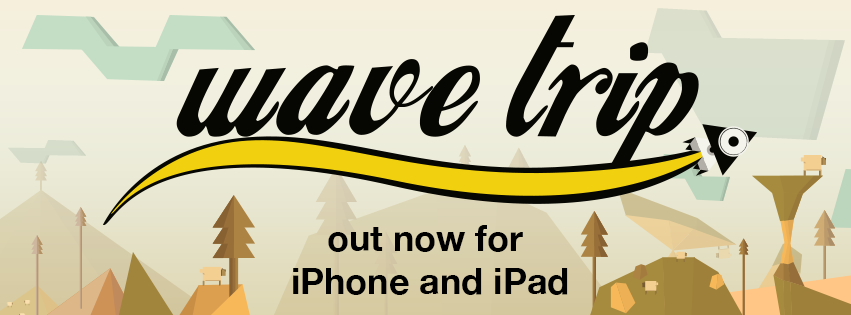
Today we are very pleased to announce the release of our next game: Wave Trip for iPhone and iPad! Check out or promotional website, or go directly to the app store to buy it for yourself.
Wave Trip is a musical arcade game for iPad and iPhone. You control a mysterious and wonderful geometric astronaut as she travels through worlds of unimaginable beauty and danger, saving her friends through the medium of awesome tunes.
Players can create their own levels and share them with the world. Every object in Wave Trip has musical characteristics, so creating a level is just like writing a piece of music – just easier.
Here is our trailer video:
Wave Trip has already gotten a pretty amazing reception online, with esteemed organisations like Gamezebo, 148 Apps, The Cult of Mac, Pocketgamer, Kotaku, and The Verge all singing their praises. A few examples:
Wave Trip works because it’s different, because it experiments with new ideas and lets you experiment with the results. It’s fun, clever, and a delight to play or listen to. Or both. Highly recommended. (Cult of Mac)
Wave Trip is delivers an almost flawless gameplay experience and sweetens the deal even more with the level editor. (148 Apps)
Lucky Frame have democratized being Mozart with Wave Trip as creating beautiful scores takes only a slight sense of a beat to pull off. IndieStatik
Wave Trip is a magnificent creation that inspires and delights. Kotaku
We’re very proud of Wave Trip, and we hope you enjoy it! Have a play, and be sure to let us know what you think.
Bad Hotel IGF Nominated

We are excited! For the second year running we have been nominated for an IGF Award for Excellence in Audio – this time for Bad Hotel.
Congrats to all the nominees…and thanks to fellow finalists Simogo for the image inspiration…
Bad Hotel wins a BAFTA!
We are very pleased to say that Bad Hotel, already known as one of the best credit crunch satire musical tower defence games on the iTunes Store, has been awarded a Scottish BAFTA for Best Game!
It’s really exciting for our work to be acknowledged, and the awards ceremony was loads of fun too. We would like to thank Creative Scotland and Channel 4 for their support.

For now our shiny new award is on our award shelf (which doubles as soldering station). Hopefully there are more on the way!
Bad Hotel, One Month On

Bad Hotel was released one month ago. To celebrate our one month anniversary, we are pleased to today release Bad Hotel 1.2. The update includes the Game Center achievements and leaderboards, along with the much-requested placement improvements which make the game even better. Go get it now!
Additionally, we would like to share a few stats with you, which I will then discuss in a bit more detail. There’s also a treat at the end of this, if you make it to the bottom…
So, what’s it like releasing a game like Bad Hotel? In a word, it’s been amazing. The reception and feedback we received was overwhelming, and to be honest we struggled a bit to cope (whilst still touring, producing our next game, helping to organise Music Hack Day Scotland, and many other fun things).
We also learned some valuable lessons. But first! Numbers!
- Metacritic Score: 84
- Number of online/print reviews: 35
- Number of promo codes used: 48
- Number of promo codes sent to journalists or organisations that did not end up writing anything: 3
- Total number of sales: 8,357
- Total number of updates to version 1.1: 6,089
- Total number of App Store Reviews (in major countries): 67
- Total number of iTunes star ratings (US + UK) for version 1.0: 95
- 5 star: 45
- 4 star: 14
- 3 star: 12
- 2 star: 15
- 1 star: 9
- Total number of iTunes star ratings (US + UK) for version 1.1: 21
- 5 star: 11
- 4 star: 8
- 3 star: 0
- 2 star: 1
- 1 star: 1
- We reached #2 in iPhone and iPad Music Games virtually everywhere in the world
- We ranked between #50-70 in Games overall in most markets
- We reached #101 in overall apps in the USA (and similar in most other markets)
- We were featured in “New and Noteworthy” worldwide for two weeks (one week on the front page)
- We also were featured in “New and Noteworthy” in the Games section in most countries for a week or two
- In the Music Games section, we got a nice little graphical feature
Rankings are complicated, but a few highlights:
As a general rule, these rankings held for about a week
Features!
That’s a lot of numbers, time for some analysis.
Sales
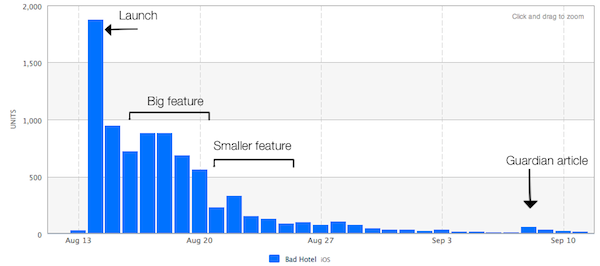
We are, of course, very pleased with the number of sales. It’s amazing to think that thousands and thousands of people are playing our game. There is no easy answer to why we sold this many copies, or indeed why we didn’t sell more. But there are several factors that are hard to ignore. Two of the major elements to look at are reviews and features.
Reviews
“Bad Hotel is, in short, the stuff of wonderful nightmares: an eerie soundtrack, a menacing palette and an all-pervading sense of inescapable doom. Yet it’s also one of the most original and atmospheric tower-defense games we’ve played all year…”
John Bedford, modojo.com
Our last game, Pugs Luv Beats, was very fortunate to be nominated for an IGF Award. It’s hard to overstate how important this was for us – it was our first proper release as a “game” studio, and it brought us an enormous amount of coverage and attention from reputable news sources such as IndieGames.com, Gamasutra, 148Apps, and many more. This opened many doors for us, and as such we were able to be in direct contact with a number of wonderful people who liked appreciated what we were trying to do and asked us to keep them posted on our projects.
This gave us the opportunity to plan out a strategy for releasing Bad Hotel to the world. We were able to send out test builds to bloggers and journalists several weeks before we even thought about a release date, and they helped us tweak and polish the game. This piqued some interest and resulted in a few preview articles around the web, which raised awareness about our upcoming release. We decided to use the brilliant Presskit() interface to create a dedicated website for people wanting to write about the game, and we created a very simple promotional website (modeled off of some of our favorite apps, like Spelltower). The aim of this site was to describe the game in as few words as possible: Build Hotel, Make Music, Stop Tadstock. We made a ridiculous video featuring building demolitions, and that was that.
Finally, despite our own impatience, we submitted the app to Apple but set the release date far in the future. The plan was to get the app approved, and then get a specific release date that we could publicize.
I’m pretty sure that all of those decisions paid off and led to the amount of attention we ended up getting. Blogs in particular are really keen to talk about something that has just been released, but writing reviews takes time! We were able to send promo codes to everyone who expressed interest, allowing them to play the game and time up their posts to the release of our app. The reviews blew us away.
“…to understand how excellent Bad Hotel is, you need to play it. And you need to hear it…I like Bad Hotel so much I’d buy it for you. Get it. It’s for iPhone and iPad. It’s wonderful. ”
Stephen Totilo, kotaku.com
“… you seriously need to check out Bad Hotel.”
Cassandra Khaw, toucharcade.com
“Bad Hotel is a delicious treat for eyes, ears, and intellect. It’s a delightful way to spend some time in a nice comfy chair, iPad in hand, with perhaps a glass of wine and fuzzy slippers upon the feet. Bravo to Lucky Frame…”
Rob LeFebvre, 148apps.com
“Bad Hotel has creamy, pastelly, Miami cocktail colours, art deco shapes, and a soundtrack of weird nightmare throbs and pulses…I really like this one…”
Christian Donlan, hookshotinc.com
“…an unlikely work of minimalist art.”
– Nick Gillett, The Guardian
We couldn’t have asked for anything better. Kotaku is one of the most popular websites for digital stuff on the internet, and though it’s hard to measure direct correlation, I’m pretty sure that review alone accounted for a good chunk of our sales.
I should also point out that exactly 0 of the reviews that we received came from sources that we had contacted blindly. Every single one of them had expressed interest in either Bad Hotel or Pugs Luv Beats, and nearly everyone had been personally in contact with us about the app. Submitting the app to blogs that have “submit your apps for review!” sections is a waste of time. Cultivating professional and personal relationships with people who care about quality creative output is the only way to get good coverage. It’s also a great way to meet extremely interesting people.
Features
This is where I would love to be able to say that Apple got in touch with us and said they loved our app and wanted to feature it. In reality, we had no idea that we were going to be featured. But I think one decision we made really helped us out – release date.
For some reason, it is common thinking in the developer world that Thursday is the best day to release an app. This probably comes from the fact that Apple refreshes their features on Thursday night, so the thinking is that you are more likely to be on their radar. In our experience, the reverse may be true – particularly for a tiny developer like us. We released Bad Hotel on a Tuesday, and generated an enormous amount of internet buzz on that Tuesday and Wednesday. I firmly believe that this buzz, and the accompanying sales, is what led to our feature. If we had released on a Thursday that buzz would probably not have reached the critical mass required to get on Apple’s radar by the time they refreshed the list. In other words – our two-day release leadup to the features release in all likelihood propelled Bad Hotel onto the lists.
It is also common thinking that getting featured on the App Store will result in instant monetary reward. In our experience, it’s a bit more nuanced than that. We certainly did not ever receive the same sales spike that we had on Day 1, but it is interesting to see how the dropoff slowed dramatically. Between Day 1 and Day 2 there was a 50% drop in sales – which was about what we were expecting. But between Day 2 and Day 3, when our “New and Noteworthy” feature started getting rolled out around the world, there was only a 20% drop, and by Day 4 we were nearly back to Day 2 sales figures. This held for a few days, and then dropped off again.
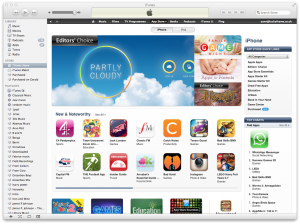
After one week of being front and center on the App Store, Apple moved us over so people had to scroll a menu to see the Bad Hotel icon. This led to another big drop in sales (scrolling is hard!). After another week we were no longer featured in most stores around the world, and our sales have now tailed off. We did get a significant bump in sales from a small review in The Guardian though, prompting Jon to declare that print media was not dead after all.
So what lessons can be learned from all of this? Being featured was great. Definitely. But even a subtle shift in how you are featured can make a really big difference, and the competition is fierce. We’d really like to be featured again, but then who wouldn’t?!
Rankings
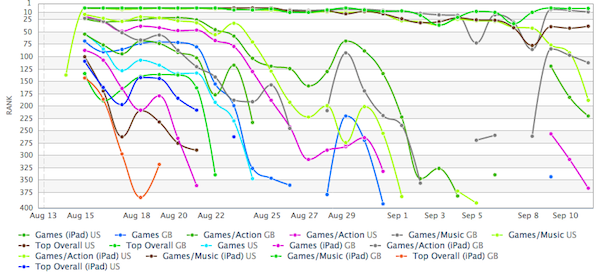
There’s not too much to say about rankings, other than they are absolutely baffling. I’m very proud that we managed to consistently outrank the new Michael Jackson music game that came out the same week as Bad Hotel, but otherwise it is hard to gain much insight. One amazing thought, though, is that we were ranked 101st overall in the USA for a couple of days. With 700,000 apps on the store, that puts us in the 99.99% percentile of sales, which is pretty decent. More shocking, though, is the idea that this ranking was the result of selling just 2000 copies. This really proves that the logarithmic curve of sales in the top 100 is insanely steep. I shudder to think how many copies you have to sell to be ranking #10.
Mistakes
Without question, our biggest mistake was releasing Bad Hotel with a placement control system that wasn’t perfect. Placing rooms quickly and precisely is a very important part of the gameplay, and (in classic game designer fashion) we got used to the system we made and couldn’t see how difficult it was to use. Some of our testers had mentioned problems to us, and we fixed small things without addressing the fundamental issues. In our defense, programming a system for placing blocks on a core building according to finger position is harder than it may seem! But we really should have given it more time.
Interestingly, virtually all of the official game reviewers were able to look past this issue, resulting in our very high Metacritic score and complete lack of bad reviews. iTunes reviewers, on the other hand, were a bit more damning. Whilst our average star ratings remain very high, a small but very vocal minority took it upon themselves to savagely criticize the game, almost exclusively due to the placement controls.
We have, as mentioned, now addressed this issue with the 1.2 update (go download it!) but the damage is done. These negative ratings probably effected our sales and it was definitely very frustrating for us.
As a side note, the App store rating and review system is totally bonkers. We are certainly not the first developers to express this, but I really hope it changes at some point. The part the frustrates us the most is the inability to respond to reviews, or even contact the reviewers in any way whatsoever. For example, when someone gives us a 1 star review because it doesn’t work on their iPhone 3GS, even though we tested extensively on that device we are unable to work out why it didn’t work for them – and presumably we are losing sales due to their public airing of a problem which is unlikely to affect anyone else. One approach we have taken to addressing this problem is making videos called “Letters from the iTunes Mailbox”, where we personally respond to some of these reviews.
The other main criticism Bad Hotel has received is that it is too hard. This is a much more difficult critique to address. Overall I think it comes from two places – expectation, and strategy. Gaming culture seems to have moved away from difficult games, and we see that as a tragedy. We don’t plan on making our game any easier, because beating a game should be hard. End of story.
However, there are almost certainly design decisions we could make to help the players understand that there are different strategies to beating Bad Hotel. One problem we’ve often noticed is that players tend to settle into one way of playing the game, and when they reach a level that requires a different approach they consistently lose – without realizing that a different strategy will beat the level easily. We still haven’t quite figured out how to guide the player to exploring different strategies, so that’s something to work on in the future.
Conclusion
Go get the update! Also, I hope this analysis has given some insight into what it’s been like to release Bad Hotel, and by extension what it is like to release a game into the App Store. And I promised a treat! If you haven’t bought Bad Hotel yet, shame on you. But here are five promo codes for free copies. First come, first served.
NA367L4RKERH
3RX7XPFA7WP4
L4MYJA6WWAK9
6KT9YEHWPH6P
KFKMXNT3RTAK
Oh, and we are currently working on our next game, which is pretty different and amazing! We’ll start talking about that soon…


